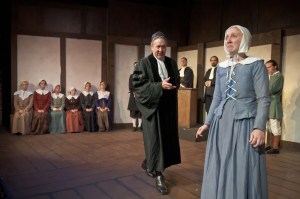 Arthur Miller’s enduring take on the contagion of hysteria gets a successful staging.
Arthur Miller’s enduring take on the contagion of hysteria gets a successful staging.
Mean girls in the 21st century have a lot to learn from Abigail Williams. As the spiteful ringleader of the snowballing witch hunt at the center of Arthur Miller’s classic parable, The Crucible (now playing at the Keegan Theatre at Church Street), the young Williams deflects judgment of her own behavior with frenzied accusations of witchcraft among her neighbors—claims that burn like wildfire through her god-fearing Puritan community. When combined with Williams’s married lover, the guilt-plagued John Proctor (Mark A. Rhea), his stoic wife, an earnest out-of-town preacher, and a healthy dose of mob mentality, the consequences are devastating.
Director Susan Marie Rhea’s Crucible, which recently toured in Ireland , frames 1692 Salem in rustic beams and earthen colors, with austere lighting and haunting swells of music to complement the solemn subject matter.
Heading up a solid cast, Sarah Lasko’s Williams taps into the same icy, calculating cruelty that arouses fear throughout high school cafeterias everywhere, and injects it with the extra venom of a jilted mistress on a mission for revenge. By contrast, her lover’s betrayed wife, Elizabeth Proctor (Karen Novack), emanates a quiet strength and goodness that makes Salem’s growing madness seem even more absurd. Commanding the stage in all of his scenes, the visiting Reverend John Hale (a captivating Kevin Hasser) evolves throughout the play and brings a nuanced performance to a character fighting for reason against the increasingly unreasonable powers that be.
As for the havoc-wreaking clique fanning the flames, a posse of squealing young actresses (some only in elementary school), gets it just right.
In case you’ve never caught a Justin Bieber concert, teenage girls have a certain knack for stirring up heart-pounding hysteria, and these young women embrace those talents with relish. Climactic scenes in the courthouse, fueled by their shrieking and swooning, are chilling. (“They’re all marvelous pretenders,” John Proctor says—and he’s right.) With evocative eyes the size of saucers and a white-knuckled grasp of the horror building around her, Mary Warren (Emily Riehl-Bedford), a servant in the Proctor home, is especially riveting.
 … The formal cadences and language of Miller’s script make the action all the more striking (and will likely have you suppressing the urge to refer to female acquaintances as “Goody” from now on). When the play debuted in 1952, much was made of its parallels to the unfounded panic of McCarthyism, and those lessons today are further heightened by post-9/11 fear and intolerance. The show raises universal questions of pride, guilt, reputation, and faith, which is probably part of what makes it one of the most enduring plays of our time. But what really strikes a nerve with Miller’s story, and with Keegan’s interpretation of it, is its ability to pierce the shadowy underpinnings of humanity in all its multifaceted glory—from deep-seated selfishness and savagery to godly grace.
… The formal cadences and language of Miller’s script make the action all the more striking (and will likely have you suppressing the urge to refer to female acquaintances as “Goody” from now on). When the play debuted in 1952, much was made of its parallels to the unfounded panic of McCarthyism, and those lessons today are further heightened by post-9/11 fear and intolerance. The show raises universal questions of pride, guilt, reputation, and faith, which is probably part of what makes it one of the most enduring plays of our time. But what really strikes a nerve with Miller’s story, and with Keegan’s interpretation of it, is its ability to pierce the shadowy underpinnings of humanity in all its multifaceted glory—from deep-seated selfishness and savagery to godly grace.



